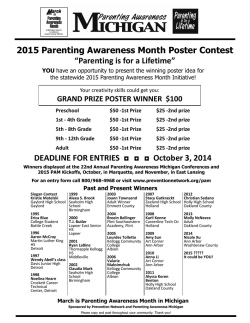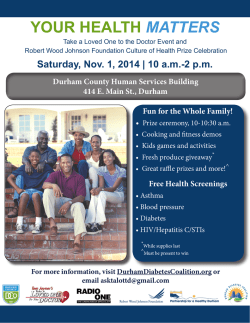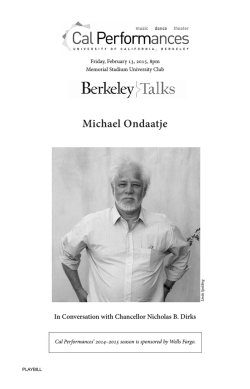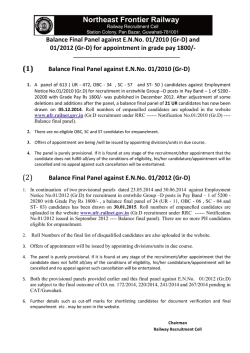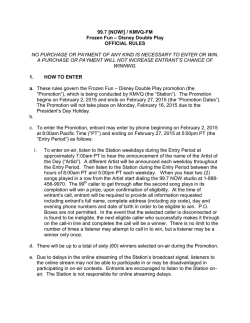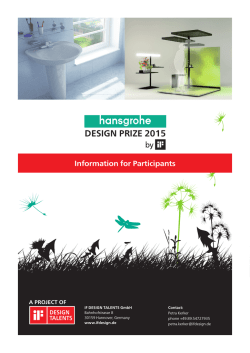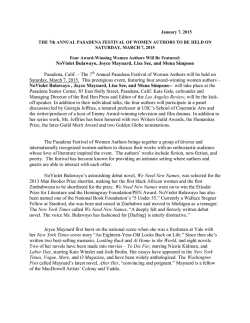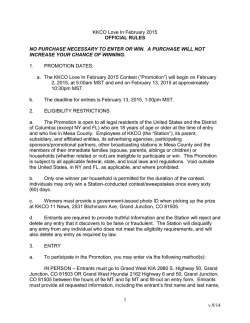
EB136/41 - World Health Organization
EXECUTIVE BOARD 136th session Agenda item 13.3 EB136/41 31 January 2015 Awards 1. Dr A.T. Shousha Foundation Prize – Report of the Dr A.T. Shousha Foundation Committee The Dr A.T. Shousha Foundation Prize is awarded to a person having made the most significant contribution to any health problem in the geographical area in which Dr A.T. Shousha served WHO, namely, the Eastern Mediterranean Region. During the sixty-first session of the Regional Committee for the Eastern Mediterranean (Tunis, 19–22 October 2014), the Dr A.T. Shousha Foundation Committee met on 21 October 2014, chaired by His Excellency Professor Mohamed Saleh ben Ammar, Minister of Health, Tunisia (Chairperson of the Regional Committee). The Committee reviewed nominations from Egypt, the Islamic Republic of Iran, Iraq and Sudan. The Committee members considered the applications of the five candidates and recommended that the candidate from Saudi Arabia, Dr Yagoub Yousef Al Mazrou, be selected as the person to be proposed to the Executive Board at its 136th session as the recipient of the Prize. If the Board confirms the award, the laureate will receive the equivalent of 2500 Swiss francs in United States dollars. Dr Yagob Yousef Al Mazrou is being honoured for his significant contribution to public health in Saudi Arabia. Following his early career as a general practitioner and paediatrician, Dr Al Mazrou served with the Ministry of Health, Saudi Arabia, from 1983 to 1993. As Director-General, his responsibilities included health centres and hospitals. During this time, he was instrumental in developing primary health care in Saudi Arabia, overseeing a major expansion in the network of health centres, improvements in child immunization coverage and improvements to the health security of pilgrims. Throughout his career, Dr Al Mazrou has made significant contributions in the field of epidemiology of infectious diseases. He continues to be active in the development of health care. Dr Al Mazrou graduated from Mosul Medical College in 1971 and obtained a Diploma in Child Health from the Royal College of Physicians and Surgeons, Ireland, in 1977. He gained a PhD from City University London in 1992. From 1993 to 2009, he served as Assistant Deputy Minister of Health with successive responsibility for different departments. A Fellow of the Royal College of General Practitioners, Dr Al Mazrou has received several national and international awards and has published more than 100 articles in scientific journals and other publications. He has served on expert committees and advisory panels at national, regional and global levels and is currently SecretaryGeneral for the Council of Health Services, Saudi Arabia. EB136/41 2. Jacques Parisot Foundation – Report of the Jacques Parisot Foundation Committee Meeting The Foundation Committee of the Jacques Parisot Foundation, which is governed by the laws of Switzerland, met on 28 January 2015 under the chairmanship of Mr Mohamed Hussain Shareef (Maldives), Chairman of the Executive Board. The other members of the Foundation Committee present at the meeting were Dr Dirk Cuypers (Belgium), Dr Yankalbe Paboung Matchock Mahouri (Chad) and Dr Walid Ammar (Lebanon), Vice-Chairmen of the Executive Board. The Executive Board is invited to note that, following a careful review of the challenges related to the administration of the Foundation, and considering that the goal of the Foundation can no longer be met, the Foundation Committee decided to dissolve the Foundation, subject to all approvals and actions required under Swiss law. The Foundation Committee also decided to apply the funds in support of a WHO activity in the field of public health research, for example, Ebola virus disease control. The Director-General, as Administrator of the Foundation, will take all actions required under Swiss law to effect the dissolution, including, as necessary, representing the Foundation, overseeing the liquidation, and seeking all necessary approvals from the Swiss surveillance authorities. 3. Sasakawa Health Prize – Report of the Sasakawa Health Prize Selection Panel The Sasakawa Health Prize is awarded for outstanding innovative work in health development to a person or persons, an institution or institutions, or a nongovernmental organization or organizations. Such work includes the promotion of given health programmes or notable advances in primary health care. The Sasakawa Health Prize Selection Panel met on 27 January 2015, chaired by Mr Mohamed Hussain Shareef (Maldives), Chair of the Executive Board. The other Panel members were Mr Jeon Man-bok, member of the Executive Board for the Republic of Korea, and Professor Hiroyoshi Endo, representing the Founder of the Prize. The Panel members consider the applications of the ten candidates, together with the Administrator’s technical comments on each. The Panel, bearing in mind the statutes and guidelines governing the award of the Prize, decided unanimously to propose to the Executive Board that the 2015 Prize be awarded to Childbirth with Dignity Foundation (Poland). If the Board confirms the award, the laureate, as an organization, will receive US$ 40 000. A brief description of the work carried out by the proposed laureate is given below for the consideration of the Executive Board. The Foundation for Childbirth with Dignity, established in 1996, is being honoured for its significant and innovative contribution to public health in Poland. The Foundation for Childbirth with Dignity is the continuation of a very successful national campaign, organized in 1994 by the Ecology Educational Centre and two national publications. The aim was to initiate a public dialogue on the subject of childbirth. Numerous physicians and midwives actively responded to the call for change and thus began a transformation in the field of obstetrics in Poland. During childbirth, women are now able to be accompanied by their partner; they may have visitors following delivery, and are no longer separated from the babies after birth. 2 EB136/41 The Foundation for Childbirth with Dignity, established in 1996, is a nongovernmental organization that works to improve the quality of perinatal care in maternity institutions in Poland. Its aims include to empower women so that they may express openly their needs and demand respect for their rights, and to create a society that recognizes the importance of childbirth and motherhood, which, will transform society into one that is more sensitive, open and caring. The Foundation proposes to use the prize money to continue, and further develop, its web-portal “GdzieRodzic.info” (“WhereToGiveBirth.info”), which includes a database of hospitals and maternity wards in Poland and provides information to expecting parents, and to maintain the Foundation’s database of hospitals. The pilot project of the web-portal attracted an average of 100 000 users monthly. Its further efficiency will depend on ensuring that its database is up-to-date and that the assessed indicators are actual. 4. United Arab Emirates Health Foundation Prize – Report of the United Arab Emirates Health Foundation Selection Panel The United Arab Emirates Health Foundation Prize is awarded for an outstanding contribution to health development to a person or persons, an institution or institutions, or a nongovernmental organization or organizations. The United Arab Emirates Health Foundation Selection Panel met on 27 January 2015, chaired by Mr Mohamed Hussain Shareef (Maldives), Chairman of the Executive Board. The other Panel members present were Dr Abdullah bin Mifreh Assiri, member of the Executive Board for Saudi Arabia, and Dr Mohammad Salim Al Olama, representing the Founder of the Prize. The Panel members considered the applications of the four candidates, together with the Administrator’s technical comments on them. Bearing in mind the Statutes and guidelines governing the award of the Prize, the Panel unanimously decided to propose to the Executive Board that the United Arab Emirates Health Foundation Prize for 2015 be awarded to the “Akogo?” Foundation (Poland). If the Board confirms the award, the laureate will receive US$ 20 000. The “Akogo?” Foundation was established in 2002. Its aims are to provide free interdisciplinary inpatient rehabilitation assistance to children with severe traumatic brain injury, and to develop a systemic solution to the problem of coma in Poland. Such health service solutions require long, intensive and expensive hospitalization and rehabilitation. The “Akogo?” Foundation offers a full range of medical services for free to patients and their families. The Foundation works on many levels, through social and educational activities, increasing awareness and measuring the scale of the problem in Poland. It is also striving to increase cooperation among groups that would otherwise operate independently, including people, communities and businesses. In collaboration with the Ministry of Health, the “Agoko?” Foundation created the programme “Waking up children from a coma in the B Phase”. The “Alarm clock” Clinic, built in 2013, was the first specialized hospital for children in coma in Poland. It strives to offer the highest level of care, using different and innovative methods of treatment, diagnosis and the widest range of neurorehabilitation methods, with the aim of aiding recovery from a nervous system injury, and minimizing any functional alterations resulting from it. The Foundation allows a care giver to stay free of charge in its facilities during the patient’s stay, and encourages the carer to take an active part in the rehabilitation process. In the Clinic’s first 16 months, 12 children have woken from a coma; 3 EB136/41 significant improvements have been observed in most of the other patients. The Clinic prepares parents in giving long-term care to their children once they go home. It also supports the carers if suffering from long-term stress. The Clinic updates its protocols according to the latest medical achievements in the treatment of coma, through the exchange of scientific knowledge and findings from experimental programmes. 5. State of Kuwait Prize for Research in Health Promotion – Report of the State of Kuwait Health Promotion Foundation Selection Panel The State of Kuwait Prize for Research in Health Promotion is awarded for an outstanding contribution to research in health promotion to a person or persons, to an institution or institutions, or to a nongovernmental organization or organizations. The State of Kuwait Health Promotion Foundation Selection Panel met on 28 January 2015, chaired by Mr Mohamed Hussain Shareef (Maldives), Chairman of the Executive Board. Other Panel members present were Mr Alaa Roushdy, representing the member of the Executive Board for Egypt, and Dr Majda Al Qattan, representing the Founder of the Prize. The Panel members studied the curricula vitae and the background of the three candidates, together with the Administrator’s technical comments on each. Bearing in mind the statutes and guidelines governing the award of the Prize, the Panel decided unanimously to propose to the Executive Board that the State of Kuwait Prize for Research in Health Promotion for 2015 be awarded to Dr Alaa Eldien Mohamed El Ghamrawy (Egypt). If the Board confirms the award, the laureate will receive US$ 20 000. A brief description of the work carried out by the proposed laureate is given below for the consideration of the Executive Board. Dr Alaa Eldien El Ghamrawy was born in 1956 and is being nominated by the Ministry of Health for his personal contribution to the creation of the National Programme for Rheumatic Heart Disease (RHD) in Egypt. In 2003, Dr El Ghamrawy noted that over 60% of the total heart operations in Al Mahalla Hospital Cardiac Centre, where he was working, could be attributed to rheumatic heart disease. A group of dedicated physicians undertook a small-scale initiative for the early detection and appropriate treatment and prevention of rheumatic heart disease. The local community’s awareness and appreciation of rheumatic heart disease activities encouraged local initiatives for screening and early detection of the condition. This activity extended to rural areas. Civil society helped equip the initiative with mobile units, which included medical devices, and laboratory and computer equipment. Children between the ages of 5 and 15 years were screened free of charge by volunteers. In 2005, the Ministry of Health recognized the magnitude of the problem and established a national control programme for rheumatic heart disease, which includes training programmes for health care professionals throughout the country, including physicians, internists, paediatricians and community workers. Since the establishment of the programme, studies have shown a notable decrease in the incidence of heart operations due to rheumatic heart disease. 4 EB136/41 Amendments to the Statutes of the State of Kuwait Health Promotion Foundation In accordance with the provisions of Article 11 of the Statutes, the Panel decided unanimously to propose to the Executive Board that Articles 6.3 be deleted and Articles 4, 8 and 11 of the Statutes of the State of Kuwait Health Promotion Foundation be revised in order to: (i) streamline use of funds; (ii) take into account a change in the name of the Prize; (iii) broaden the scope of the purpose of the Prize by providing that it will reward an outstanding contribution to research in the areas of health care for the elderly and in health promotion; (iv) allow for a supplemental funding mechanism; and (v) streamline processes. If approved by the Executive Board, the text of Articles 4, 8 and 11 would now read as follows: Article 4 Purpose The purpose of the Foundation is to award a prize (“His Highness Sheikh Sabah Al-Ahmad Al-Jaber Al-Sabah Prize for Research in Health Care for the Elderly and in Health Promotion”) to a person or persons, an institution or institutions or a nongovernmental organization or organizations, who have made an outstanding contribution to research in the areas of health care for the elderly and in health promotion. The specific criteria that shall be applied in the assessment of the work done by the candidate/candidates shall be determined by the Foundation Selection Panel. Article 8 The Prize The Prize shall consist of a certificate of award and a sum of money, together with a plaque from the Founder, which shall be awarded not more often than once in each year, derived from the interest on the Foundation’s capital and unutilized cumulative revenues, which may be supplemented by the Founder. The sum of money initially determined may be adjusted from time to time by the Selection Panel, based on the changes in the capital of the Foundation, variation in interest rates and other relevant factors. If the Prize is awarded to more than one person, an institution or institutions, or a nongovernmental organization or organizations, the sum of money shall be proportionately distributed between them. Article 11 Revision of the Statutes On the proposal of one of its members, the Foundation Selection Panel may propose the revision of the present Statutes. Any such proposal, if endorsed by a majority of the members of the Selection Panel, shall be submitted to the Executive Board for approval. 5 EB136/41 6. Dr LEE Jong-wook Memorial Prize for Public Health – Report of the Dr LEE Jong-wook Memorial Prize Selection Panel The Dr LEE Jong-wook Memorial Prize for Public Health is awarded to a person or persons, an institution or institutions, a governmental or nongovernmental organization or organizations, who have made an outstanding contribution in public health. The Dr LEE Jong-wook Memorial Prize Selection Panel met on 27 January 2015, chaired by Mr Mohamed Hussain Shareef (Maldives), Chairman of the Executive Board. The other Panel members were Mr Martin Bowles, member of the Executive Board for Australia, and Dr Won-seok Sir, Representative of the Founder. The Panel members studied the curricula vitae and the backgrounds of four of the five candidates that were nominated, and decided unanimously to propose to the Executive Board that the 2015 Prize should be awarded to the Thalassemia International Federation (Cyprus). If the Board confirms the award, the laureate will receive US$ 100 000. A brief description of the work carried out by the proposed laureate is given below for the consideration of the Executive Board. The Thalassemia International Federation was established in 1987 in Nicosia as a non-profit, nongovernmental, patient-driven international organization. Its goal is to improve the survival and quality of life of patients with thalassemia around the world. This is achieved through established support mechanisms and the development of national control programmes that work on prevention and management of the disorder. In just over 25 years, the Thalassemia International Federation has contributed to the development and dissemination of knowledge on prevention and clinical management of thalassemia and sickle-cell diseases in many countries. It has empowered patients and their families at local and national level, while promoting and recommending resolutions at national and international level. The Thalassemia International Federation has established 117 National Thalassemia Associations in 57 countries and has organized numerous national, regional and international conferences, seminars and workshops. The Federation has also established official relations with relevant international stakeholders, including WHO, and has prepared and distributed educational materials. The success of the Thalassemia International Federation is based on the following: effective, evidence-based and regularly updated educational programmes; the Federation’s collaboration with WHO and other organizations, and with health professionals, national and international bodies; the establishment of networks with academic and public health organizations and expert centres; and the production of position papers, including those for the promotion of patients’ rights and non-transfusion dependent thalassemia, and information to patients on counterfeit medicines and chronic liver disease. = 6 = =
© Copyright 2026
